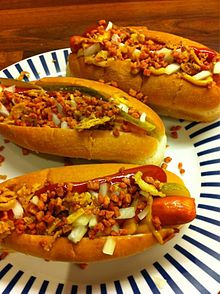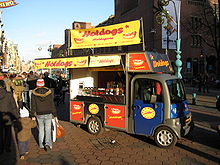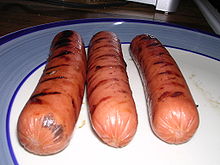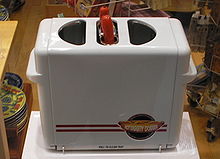- Hot dog
-
For other uses, see Hotdog (disambiguation).
Hot dog 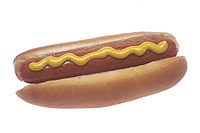
A cooked hot dog on a bun garnished with mustard.Origin Alternative name(s) Frankfurters
Franks
Wieners
WeeniesDish details Serving temperature Hot Main ingredient(s) Pork, beef, chicken, or combinations thereof, and bread Variations Multiple Other information Hot dogs are often pink but may be brown. A hot dog is a sausage served in a sliced bun. It is very often garnished with mustard, ketchup, onions, mayonnaise, relish and/or sauerkraut.
Contents
History
Claims about hot dog invention are difficult to assess, as stories assert the creation of the sausage, the placing of the sausage (or another kind of sausage) on bread or a bun as finger food, the popularization of the existing dish, or the application of the name "hot dog" to a sausage and bun combination most commonly used with ketchup or mustard and sometimes relish.
The word frankfurter comes from Frankfurt, Germany, where pork sausages served in a bun similar to hot dogs originated.[1] These sausages, Frankfurter Würstchen, were known since the 13th century and given to the people on the event of imperial coronations, starting with the coronation of Maximilian II, Holy Roman Emperor as King. Wiener refers to Vienna, Austria, whose German name is "Wien", home to a sausage made of a mixture of pork and beef[2] (cf. Hamburger, whose name also derives from a German-speaking city). Johann Georg Lahner, a 18th/19th century butcher from the Franconian city of Coburg, is said to have brought the Frankfurter Würstchen to Vienna, where he added beef to the mixture and simply called it Frankfurter.[3] Nowadays, in German speaking countries, except Austria, hot dog sausages are called Wiener or Wiener Würstchen (Würstchen means "little sausage"), in differentiation to the original pork only mixture from Frankfurt. In Swiss German, it is called Wienerli, while in Austria the terms Frankfurter or Frankfurter Würstel are used.
Around 1870, on Coney Island, German immigrant Charles Feltman began selling sausages in rolls.[4][5][6]
Others have supposedly invented the hot dog. The idea of a hot dog on a bun is ascribed to the wife of a German named Antonoine Feuchtwanger, who sold hot dogs on the streets of St. Louis, Missouri, United States, in 1880, because his customers kept taking the white gloves handed to them for eating without burning their hands.[7] Anton Ludwig Feuchtwanger, a Bavarian sausage seller, is said to have served sausages in rolls at the World's Fair–either the 1893 World's Columbian Exposition in Chicago or the 1904 Louisiana Purchase Exposition in St Louis[8]–again allegedly because the white gloves he gave to customers so that they could eat his hot sausages in comfort began to disappear as souvenirs.[9]
The association between hot dogs and baseball began as early as 1893 with Chris von der Ahe, a German immigrant who owned not only the St. Louis Browns, but also an amusement park.[10]
Harry M Stevens Inc., founded in 1889, serviced major sports venues with hot dogs and other refreshments, making Stevens known as the "King of Sports Concessions" in the US.[11]
In 1916, a German American employee of Feltman's named Nathan Handwerker was encouraged by celebrity clients Eddie Cantor and Jimmy Durante to go into business in competition with his former employer.[12] Handwerker undercut Feltman's by charging five cents for a hot dog when his former employer was charging ten.[12]
At an earlier time in food regulation the hot dog suspect, Handwerker made sure that men wearing surgeon's smocks were seen eating at Nathan's Famous to reassure potential customers.[9]
Etymology
Hot dog vendor in Amsterdam
The term "dog" has been used as a synonym for sausage since 1884 and accusations that sausage makers used dog meat date to at least 1845.[13] In the early 20th century, consumption of dog meat in Germany was common.[14] The suspicion that sausages contained dog meat was "occasionally justified."[15]
According to a myth, the use of the complete phrase "hot dog" in reference to sausage was coined by the newspaper cartoonist Thomas Aloysius "TAD" Dorgan around 1900 in a cartoon recording the sale of hot dogs during a New York Giants baseball game at the Polo Grounds.[13] However, TAD's earliest usage of "hot dog" was not in reference to a baseball game at the Polo Grounds, but to a bicycle race at Madison Square Garden, in The New York Evening Journal December 12, 1906, by which time the term "hot dog" in reference to sausage was already in use.[13][16] In addition, no copy of the apocryphal cartoon has ever been found.[17]
The earliest known usage of "hot dog" in clear reference to sausage, found by Fred R. Shapiro, appeared in the December 31, 1892 issue of the Paterson (NJ) Daily Press.[18] The story concerned a local traveling vendor, Thomas Francis Xavier Morris, also known as "Hot Dog Morris".[19]
Somehow or other a frankfurter and a roll seem to go right to the spot where the void is felt the most. The small boy has got on such familiar terms with this sort of lunch that he now refers to it as "hot dog." "Hey, Mister, give me a hot dog quick," was the startling order that a rosy-cheeked gamin hurled at the man as a Press reporter stood close by last night. The "hot dog" was quickly inserted in a gash in a roll, a dash of mustard also splashed on to the "dog" with a piece of flat whittled stick, and the order was fulfilled.
—Paterson Daily Press, Dec. 31, 1892, pg. 5
Other early uses of "hot dog" in reference to sausage appeared in the New Brunswick (NJ) Daily Times (May 20, 1893), the New York World (May 26, 1893), and the Knoxville (TN) Journal (Sep. 28, 1893).[16]
General description
Ingredients
Common hot dog ingredients include:[20]
- Meat trimmings and fat
- Flavorings, such as salt, garlic, and paprika
- Preservatives (cure) - typically sodium erythorbate and sodium nitrite
Pork and beef are the traditional meats used in hot dogs. Less expensive hot dogs are often made from chicken or turkey, using low cost mechanically separated poultry. Hot dogs often have high sodium, fat and nitrite content, ingredients linked to health problems. Changes in meat technology and dietary preferences have led manufacturers to use turkey, chicken, vegetarian meat substitutes, and to lower the salt content.
If a manufacturer produces two types of hot dogs, "wieners" tend to contain pork and are blander, while "franks" tend to be all beef and more strongly seasoned.[citation needed]
Commercial preparation
Hot dogs are prepared commercially by mixing the ingredients (meats, spices, binders and fillers) in vats where rapidly moving blades grind and mix the ingredients in the same operation. This mixture is forced through tubes into casings for cooking. Most hot dogs sold in the US are "skinless" as opposed to more expensive "natural casing" hot dogs.
Natural casing hot dogs
As with most sausages, hot dogs must be in a casing to be cooked. Traditional casing is made from the small intestines of sheep. The products are known as "natural casing" hot dogs or frankfurters.[21] These hot dogs have firmer texture and a "snap" that releases juices and flavor when the product is bitten.[21]
Kosher casings are expensive in commercial quantities in the US, so kosher hot dogs are usually skinless or made with reconstituted collagen casings.[21]
Skinless hot dogs
"Skinless" hot dogs must use a casing in the cooking process when the product is manufactured, but the casing is usually a long tube of thin cellulose that is removed between cooking and packaging. This process was invented in Chicago in 1925.[22]
Skinless hot dogs vary in the texture of the product surface but have a softer "bite" than natural casing hot dogs. Skinless hot dogs are more uniform in shape and size than natural casing hot dogs and less expensive.
Home cooking hot dogs
Hot dogs are prepared and eaten in a variety of ways. The wieners may be boiled, grilled, fried, steamed, broiled, baked, or microwaved.[23] The cooked wiener may be served on a bun (usually topped with condiments), or it may be used as an ingredient in another dish.
Health effects
Unlike other sausages which may be sold uncooked, hot dogs are precooked before packaging. Hot dogs can be eaten without additional cooking, although they are usually warmed before serving. Because an unopened, packaged hot dog can have listeriosis bacteria, it is safer to heat them, especially for pregnant women and those with suppressed immune systems.[24]
An American Institute for Cancer Research report found that consuming one 50-gram serving of processed meat — about one hot dog — every day increases risk of colorectal cancer by 20 percent.[25][26] The Cancer Project group filed a class-action lawsuit demanding warning labels on packages and at sporting events.[27] Hot dogs are high in fat and salt and have preservatives sodium nitrate and nitrite, believed to cause cancer.[28] According to the AICR, the average risk of colorectal cancer is 5.8 percent, but 7 percent when a hot dog is consumed daily over years.[28]
Hot dogs have relatively low heterocyclic amines (HCA) levels compared to other types of ready-to-eat meat products, because they are manufactured at low temperatures.[29]
Choking risk
Hot dogs present a significant choking risk, especially for children. A study in the US found that 17% of food-related asphyxiations among children younger than 10 years of age were caused by hot dogs.[30] Their size, shape and texture make them difficult to expel from the windpipe. This risk can be reduced by cutting a hot dog into small pieces or lengthwise strips before serving to young children. It is suggested that redesign of size, shape and texture would reduce the risk.[31] Pediatric emergency doctors note that a stuck hot dog is almost impossible to dislodge from a child's windpipe.[31]
In the United States
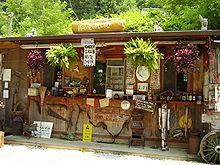 A roadside hot dog stand near Huntington, West Virginia
A roadside hot dog stand near Huntington, West Virginia
In the US, "hot dog" may refer to just the sausage or to the combination of a sausage in a bun. There have been many nicknames for hot dogs that have popped up over the years. A hot dog can often be seen under the names of frankfurter, frank, red hot, wiener, weenie, durger, coney, or just "dog".
Hot dog restaurants
Hot dog stands and trucks sell hot dogs at street and highway locations. Wandering hot dog vendors sell their product in baseball parks. At convenience stores, hot dogs are kept heated on rotating grills. 7-Eleven sells the most grilled hot dogs in North America, 100 million yearly.[32][33] Hot dogs are also common on restaurants' children's menus.
Condiments
 For a list of regional differences in hot dog preparation and condiments, see Hot dog variations.
For a list of regional differences in hot dog preparation and condiments, see Hot dog variations.Common hot dog condiments include ketchup, mustard, chile con carne, pickle relish, sauerkraut, onion, mayonnaise, lettuce, tomato, cheese and chili peppers.
The US-based National Sausage and Hot Dog Council in 2005 found mustard to be the most popular condiment, with 32 percent of respondents preferring it; 23 percent of Americans said they preferred ketchup, chili con carne came in third at 17 percent, followed by relish at 9 percent and onions at 7 percent. Southerners showed the strongest preference for chili, while Midwesterners showed the greatest affinity for ketchup."[34] Condiments vary across the country. All-beef Chicago-style hot dogs are topped with mustard, fresh tomatoes, onions, sport peppers, bright green relish, dill pickles, and celery salt, but they exclude ketchup.
Many variations are named after regions other than the one in which they are popular. Italian hot dogs popular in New Jersey include peppers, onions, and potatoes. Meaty Michigan hot dogs are popular in upstate New York (as are white hots), while beefy Coney Island hot dogs are popular in Michigan. In New York City, conventional hot dogs are available on Coney Island, as are bagel dogs. Hot wieners, or weenies, are a staple in Rhode Island. Texas hot dogs are spicy variants found in upstate New York and Pennsylvania (and as "all the way dogs" in New Jersey), but not Texas.
Some baseball parks have signature hot dogs, such as Fenway Franks at Fenway Park in Boston, Massachusetts and Dodger Dogs at Dodger Stadium in Los Angeles, California. The Fenway signature is that the hot dog is boiled and grilled Fenway-style, and then served on a New England-style bun, covered with ketchup and relish. Often during Red Sox games, vendors traverse the stadium selling the hot dogs plain, giving customers the choice of adding the condiments.[citation needed]
Hot dogs outside North America
For a list of international differences in hot dogs, see Hot dog variations.In most of the world, "hot dog" is recognized as a sausage in a bun, but the type varies considerably. The name is applied to something that would not be described as a hot dog in North America. For example, in New Zealand, it refers to a battered sausage, often on a stick, and the version in a bun is called an "American hot dog".
Records
The world's longest hot dog created was 60 metres (197 ft), which rested within a 60.3-metre (198 ft) bun. The hot dog was prepared by Shizuoka Meat Producers for the All-Japan Bread Association, which baked the bun and coordinated the event, including official measurement for the world record. The hot dog and bun were the center of a media event in celebration of the Association's 50th anniversary on August 4, 2006, at the Akasaka Prince Hotel, Tokyo, Japan.
The world's most expensive hot dog was prepared by Joe Calderone for Trudy Tant. Featuring truffle oil, duck foie gras, and truffle butter, the dog sold for $69 USD.[35]
See also
- Advanced meat recovery
- By-products
- Mechanically separated meat
- Sausage bun
- Sausage sandwich
- Vienna sausage
Notes
- ^ Harper, Douglas. "frankfurter". Online Etymology Dictionary. http://www.etymonline.com/index.php?term=frankfurter. Retrieved 2009-10-17.
- ^ Harper, Douglas. "wiener". Online Etymology Dictionary. http://www.etymonline.com/index.php?term=wiener. Retrieved 2009-10-17.
- ^ Schmidt 2003:241
- ^ Immerso 2002:23
- ^ Sterngass 2001:239
- ^ "History of the Hot Dog" page of ePopcorn.com.
- ^ Hot Dog History
- ^ McCullough 2000:240
- ^ a b Jakle & Sculle 1999:163–164
- ^ McCollough 2006:Frankfurter, she wrote: Hot dog shrouded in mystery
- ^ www.harrystevens.co.uk
- ^ a b Immerso 2002:131
- ^ a b c Wilton 2004:58–59
- ^ (PDF) Germany's dog meat market; Consumption of Canines and Horses Is on the Increase.. The New York Times. June 23, 1907. http://query.nytimes.com/mem/archive-free/pdf?_r=1&res=9B04E4D9133EE033A25750C2A9609C946697D6CF&oref=slogin. Retrieved 2008-01-20, Bureau Of Manufactures, United States; Bureau Of Foreign Commerce (1854-1903), United States; Bureau Of Statistics, United States. Dept. of Commerce and Labor (1900). Monthly consular and trade reports, Volume 64, Issues 240-243.. United States. Bureau of Manufactures, Bureau of Foreign Commerce, Dept. of Commerce. http://books.google.com/?id=3mZJAAAAMAAJ&pg=PP5&q=. Retrieved 2009-09-29
- ^ "Hot Dog", Online Etymology Dictionary, http://www.etymonline.com/index.php?allowed_in_frame=0&search=hot+dog&searchmode=none
- ^ a b Popik 2004:"Hot Dog (Polo Grounds myth & original monograph)"
- ^ "Hot Dog". Snopes. July 13, 2007. http://www.snopes.com/language/stories/hotdog.asp. Retrieved 2007-12-13.
- ^ Zimmer, Ben (May 13, 2011). "'Hot Dog': The Untold Story". Visual Thesaurus. http://www.visualthesaurus.com/cm/wordroutes/2847. Retrieved May 13, 2011.
- ^ "Searching history for hot dog's origin". 2011-07-04. http://www.npr.org/templates/transcript/transcript.php?storyId=137530290. Retrieved 2011-07-24.
- ^ National Hot Dog and Sausage Council glossary of sausages Retrieved August 15, 2011
- ^ a b c Levine 2005:It's All in How the Dog Is Served
- ^ Zeldes, Leah A. (2010-07-08). "Know your wiener!". Dining Chicago. Chicago's Restaurant & Entertainment Guide, Inc.. http://www.diningchicago.com/blog/2010/07/08/know-your-wiener/. Retrieved 2010-07-31.
- ^ Hot Dogs, Get Your Hot Dogs: all about hot dogs, wieners, franks and sausages
- ^ Health Canada: Listeria and food safety
- ^ AICR Statement: Hot Dogs and Cancer Risk, American Institute for Cancer Research, July 22, 2009.
- ^ Attack ad targets hot dogs as cancer risk, Canadian Broadcasting Company, August 27, 2008.
- ^ Hot dog cancer-warning labels sought in lawsuit: Healthy Cleveland, The Plain Dealer, August 29, 2009. Retrieved 2010-07-06.
- ^ a b New Attack Ad Targets Hot Dogs, Citing Dubious Cancer Risk, Fox News, August 26, 2008.
- ^ "A Hot Dog Healthier Than Chicken? Could Be...". ClickOnDetroit.com. 2011-03-23. http://www.clickondetroit.com/health/27296067/detail.html. Retrieved 2011-03-27.
- ^ Harris, Carole Stallings; Baker, Susan P.; Smith, Gary A.; Harris, Richard M. (May 1984), "Childhood Asphyxiation by Food: A National Analysis and Overview", JAMA 251 (17): 2231–2235, doi:10.1001/jama.251.17.2231, PMID 6708272, http://jama.ama-assn.org/content/251/17/2231.abstract
- ^ a b Szabo, Liz (February 22, 2010), "Pediatricians seek choke-proof hot dog", USA Today, http://www.usatoday.com/printedition/news/20100222/1achoke22_st.art.htm
- ^ 7-Eleven News Room: Fun Facts and Trivia.
- ^ Hot Dog Heaven at 7-Eleven
- ^ [1][dead link]
- ^ "$69 Hot Dog (Photos, Video)". National Ledger. July 28, 2010. http://www.nationalledger.com/lifestyle-home-family/69-hot-dog-photos-video-461611.shtml. Retrieved July 29, 2010.
References
- Immerso, Michael (2002), Coney Island: The People's Playground, New Brunswick, New Jersey: Rutgers University Press, ISBN 0813531381
- Jakle, John A.; Sculle, Keith A. (1999), Fast Food, Baltimore: The Johns Hopkins University Press, ISBN 0-8018-6109-8
- Levine, Ed (2005-05-25), "It's All in How the Dog Is Served", The New York Times, http://www.nytimes.com/2005/05/25/dining/25dogs.html
- McCollough, J. Brady (2006-04-02), "Frankfurter, she wrote: Hot dog shrouded in mystery", The Kansas City Star, http://www.coveringsports.com/hotdog.htm
- McCullough, Edo (2000) [1957], Good Old Coney Island: A Sentimental Journey into the Past, New York: Fordham University Press, ISBN 0823219976
- Popik, Barry (2004-07-15). "Hot Dog (Polo Grounds myth & original monograph)". The Big Apple. http://www.barrypopik.com/index.php/new_york_city/entry/hot_dog_polo_grounds_myth_original_monograph/. Retrieved 2007-05-27.
- Schmidt, Gretchen (2003), German Pride: 101 Reasons to Be Proud You're German, New York: Citadel Press, ISBN 0806524812
- Sterngass, Jon (2001), First Resorts: Pursuing Pleasure at Saratoga Springs, Newport & Coney Island, Baltimore: The Johns Hopkins University Press, ISBN 0801865867
- Wilton, David (2004), Word Myths: Debunking Linguistic Urban Legends, Oxford: Oxford University Press, ISBN 0195172841
External links
- National Hot Dog and Sausage Council
- Home page for a PBS documentary about hot dogs
- The Evolution of Hot Dogs
- USDA Fact Sheet focusing on Hot Dogs
- Know your wiener! (skinless vs. natural casing)
- National Association of Hot Dog Vendors
Hot dog variations Bagel dog · Cheese dog · Chicago dog · Chili dog · Completo · Coney Island hot dog · Corn dog · Danger dog · Dodger Dog · Half-smoke · Hamdog · Hot wiener · Italian hot dog · Ketwurst · Michigan hot dog · Montreal hot dog · Ripper · Seattle dog · Texas hot dog · Vegetarian hot dog · White hotCategories:- American sausages
- German sausages
- Hot dogs
- Street food
- Fast food
- World cuisine
Wikimedia Foundation. 2010.

